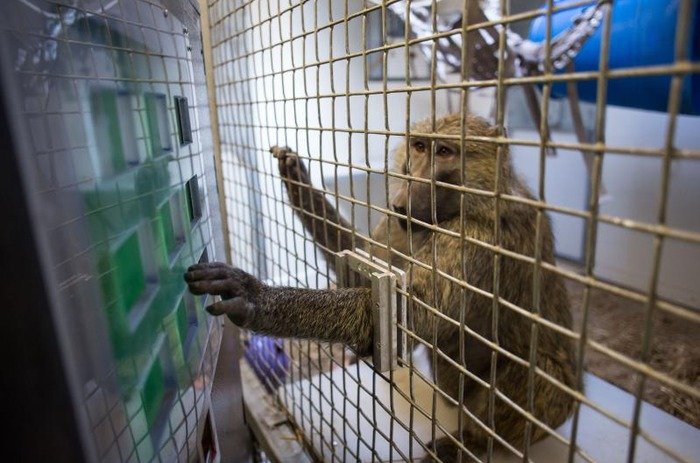Sabina, an olive baboon at the Seneca Park Zoo in Rochester, N.Y., participates in a University of Rochester study led by cognitive scientist Jessica Cantlon. Credit: J. Adam Fenster, University of Rochester
ROCHESTER, N.Y., May 3 (UPI) -- Ape and human shared traits -- opposable thumbs, expressive faces, social systems -- are joined by the ability to understand numbers, U.S. researchers say.
Scientists at the University of Rochester in New York say a study with a troupe of zoo baboons indicates number abilities are shared by humans and their primate cousins.
"The human capacity for complex symbolic math is clearly unique to our species," brain and cognitive sciences Professor Jessica Cantlon said. "But where did this numeric prowess come from?
"In this study we've shown that non-human primates also possess basic quantitative abilities. In fact, non-human primates can be as accurate at discriminating between different quantities as a human child."
The study, conducted at the Seneca Park Zoo in Rochester, tracked eight baboons, ages 4 to 14, in 54 separate trials of guess-which-cup-has-the-most-treats.
Researchers placed one to eight peanuts into each of two cups, varying the numbers in each container.
The baboons, which received all the peanuts in the cup they chose, guessed the larger quantity roughly 75 percent of the time.
The baboons were able to consistently discriminate between cups as long as the relative difference between the peanuts in each cup was large, the researchers said, but even when the difference was small -- for example six versus seven peanuts -- they picked the larger number more than half the time, the researchers said.
Research has shown that children who haven't learned to count also depend on such comparisons to discriminate between number groups.
"What's surprising is that without any prior training, these animals have the ability to solve numerical problems," Cantlon said in a Rochester release Friday.
The researcher said the results indicate baboons not only use comparisons to understand numbers but that these abilities occur naturally and in the wild.















